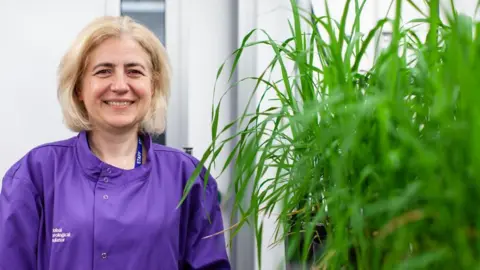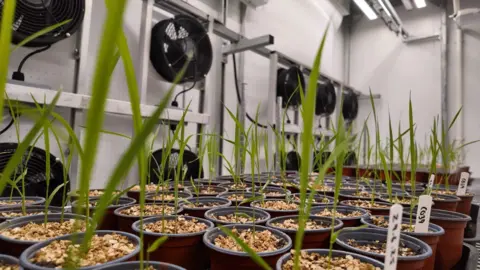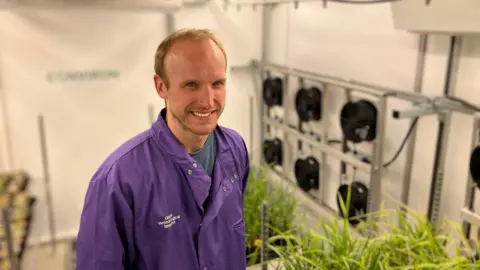Climate simulator 'brings weather into the lab'
 University of Exeter
University of ExeterA new £1.5m simulator that replicates wind and rain will allow scientists to "bring the weather into the lab" and study the effects of climate on plants, experts have said.
The new facility can mimic current and future weather patterns around the world and will help researchers learn more about how crop killing diseases spread.
The simulator will aid research into global food security problems and be available to the international research community.
Professor Ivana Gudelj of the University of Exeter said the new facility was "one of the few places in the world that could simulate wind, rain and mist all together".

'Safeguard food security'
She said: "It's really important to understand how plants respond to climate change and disease in different weather conditions.
"It's something that's really difficult to do in the field but we can now do it here."
The simulator is being used to look at how disease spreads among rice plantations, by simulating tropical conditions such as those found in China or India.
"A large number of people around the world rely on rice" said Dr Richard Lindsay, who is part of the research team.
"We really need to try and understand and prevent the destruction of the crop in order to safeguard our food security in the future."
The simulator has four plant growth chambers that will allow researchers to simulate four different climates at the same time.

The impact of weather on bee populations is also being investigated, to see how the insects might adapt to a changing climate.
"We know that bees are very responsive to rain and storms" said Professor Natalie Hempel de Ibarra, from the University of Exeter.
"But in the scenarios we are seeing more and more, where the weather changes abruptly, we don't really know how they respond and how they can adjust.
"Bees pollinate our crops and if we want to have good yields we need to have reliable pollinators and that is down to their behaviour and how they respond to the weather" Prof Hempel de Ibarra added.
The Global Meteorological Simulator (GMS) has been funded by the Biotechnology and Biological Sciences Research Council (BBSRC) and the University of Exeter.
Follow BBC Devon on X, Facebook and Instagram. Send your story ideas to [email protected].
